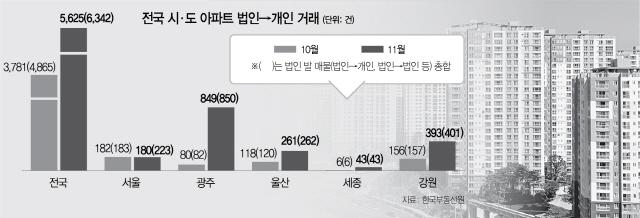To avoid the growing burden of tax and transfer tax
In November, a total of 6,342 corporate apartments were released.
936% in Gwangju City and 616% in Sejong City
4,040 out of 4,449 local purchases
House prices continue to rise… less regulatory effect
 viewer
viewer
From this year onwards, corporations’ real estate tax burden such as comprehensive real estate tax and capital gains tax has increased significantly, and corporations are being released in the market. In particular, sales by corporations were more prominent in local regions than in Seoul and other metropolitan areas, and it was found that most of these sales were received by individuals. Although the government increased the tax burden on corporations and expected the effect of lowering the house price, the rise in house prices was still solid as individuals bought corporate sales due to the nationwide real estate craze.
According to statistics from the Korea Real Estate Agency, a total of 6,342 apartments were sold nationwide in November last year. It increased 30.4% from the October figure of 4,865. The number of corporate-initiated apartment sales includes both the number of sales by a corporation to an individual and the number of sales by a corporation to a corporation.
This trend is more pronounced in the provinces. A representative place is Gwangju. In October of last year, the volume of corporate sales was only 82, but in November, it increased 936.6% to 850. Sejong-do increased 616.7% from 6 cases to 43 cases, Gyeongbuk-do 207 cases to 600 cases, 189.9%, and Gangwon-do from 157 cases to 401 cases, an increase of 155.4%. Ulsan also increased by 118.3% from 120 to 262. On the other hand, Seoul and Gyeonggi recorded an increase of 21.9% (183 cases → 223 cases) and 21.0% (1,237 cases → 1,497 cases), respectively, falling below the national average.
In order to raise the threshold for corporate housing purchases, the government raised various tax rates such as tax rates through the June 17th and July 10th measures last year. For individuals, the higher the housing price, the higher the tax rate, but for corporations, the highest tax rate is applied regardless of the price. The tax rate for corporate housing is 3% for 2 houses or less, and 6% for 3 houses or more or 2 houses in the area subject to adjustment. The corporate tax, which is a transfer tax paid when a corporation disposes of a house, also rises significantly. Currently, when a corporation sells a house, a basic tax rate of 10-25% is applied to the gains on the transfer and an additional 10% tax is imposed upon disposal of the house. A maximum of 45% is taxed on the margin. It is expected that corporate sales will be poured out by the end of the year as the subsidiary’s tax burden rises, but the number of corporate sales in rural areas has increased significantly more than the metropolitan area market, which leads the real estate market.
Most of the large-scale sales released in the provinces were bought by individuals. In November, 4,040 cases were sold to individuals out of the 4,449 cases of corporations traded in regions other than the metropolitan area such as Seoul, Incheon, and Gyeonggi. The increase in sales in the market and the accumulation of sales results in a natural decline in the house price, but the effect of lowering the house price was insignificant as individuals received the corporate quantity. This is because the demand for mid- to low-priced apartments increased as the jeonse crisis became severe after the 3rd Lease Act, and as a result, the purchase tax was concentrated in regions with many mid- to low-priced apartments.
According to the statistics of the Real Estate Agency, the local trading supply and demand index is showing the highest level in history. The record high was 114.2 in the second week of December, and 114.0 the next week. The trading supply and demand index is an index between 0 and 200 that represents the level of supply and demand in the market. If the index exceeds the threshold of 100, it means that there are more people who want to buy a house than those who want to sell it. As there are more buyers than sellers, the price of local apartments is continuing to increase. In the second week of December, it recorded the highest increase rate of 0.38% since the 2012 statistics were prepared, and the next week also showed a high increase rate of 0.37%.
/ Reporter Jiyoon Yang [email protected]
< 저작권자 ⓒ 서울경제, 무단 전재 및 재배포 금지 >
